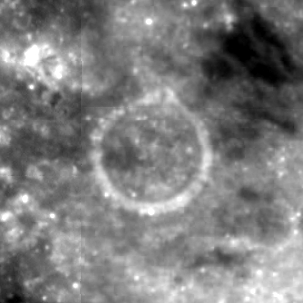Difference between revisions of "Slocum"
| Line 6: | Line 6: | ||
|} | |} | ||
<div id="toc"> | <div id="toc"> | ||
| − | [[Image: | + | [[Image:Slocum-clem1.jpg|external image slocum-clem1.jpg]]<br /> ''[http://lpod.org/coppermine/displayimage.php?pos=-696 Clementine]''<br /> <br /> |
==Images== | ==Images== | ||
[http://www.lpod.org/coppermine/thumbnails.php?album=search&type=full&search=Slocum LPOD Photo Gallery] [http://www.lpi.usra.edu/resources/lunar_orbiter/bin/srch_nam.shtml?Slocum%7C0 Lunar Orbiter Images] [http://www.lpi.usra.edu/resources/apollo/search/feature/?feature=Slocum Apollo Images]<br /> - Apollo 15's orbital panoramic ''ITEK''-camera frame [http://www.lpi.usra.edu/resources/apollo/frame/?AS15-P-9729 AS15-P-9729] shows an oblique northward look at '''Slocum''' (scroll all the way toward the frame's right margin).<br /> - Apollo 16's frames [http://www.lpi.usra.edu/resources/apollo/frame/?AS16-P-5096 AS16-P-5096] and [http://www.lpi.usra.edu/resources/apollo/frame/?AS16-P-5101 5101] show oblique southward looks at '''Slocum''' (in these frames, '''Slocum''' is touching the left margins of both).<br /> - Research orbital Apollo photography: Danny Caes<br /> <br /> | [http://www.lpod.org/coppermine/thumbnails.php?album=search&type=full&search=Slocum LPOD Photo Gallery] [http://www.lpi.usra.edu/resources/lunar_orbiter/bin/srch_nam.shtml?Slocum%7C0 Lunar Orbiter Images] [http://www.lpi.usra.edu/resources/apollo/search/feature/?feature=Slocum Apollo Images]<br /> - Apollo 15's orbital panoramic ''ITEK''-camera frame [http://www.lpi.usra.edu/resources/apollo/frame/?AS15-P-9729 AS15-P-9729] shows an oblique northward look at '''Slocum''' (scroll all the way toward the frame's right margin).<br /> - Apollo 16's frames [http://www.lpi.usra.edu/resources/apollo/frame/?AS16-P-5096 AS16-P-5096] and [http://www.lpi.usra.edu/resources/apollo/frame/?AS16-P-5101 5101] show oblique southward looks at '''Slocum''' (in these frames, '''Slocum''' is touching the left margins of both).<br /> - Research orbital Apollo photography: Danny Caes<br /> <br /> | ||
| Line 16: | Line 16: | ||
[http://en.wikipedia.org/wiki/Slocum_(crater) Slocum]<br /> <br /> | [http://en.wikipedia.org/wiki/Slocum_(crater) Slocum]<br /> <br /> | ||
==Additional Information== | ==Additional Information== | ||
| − | Depth data from [[Kurt%20Fisher% | + | Depth data from [[Kurt%20Fisher%20Crater%20Depths|Kurt Fisher database]]<br /> |
* Pike, 1976: 0.48 km | * Pike, 1976: 0.48 km | ||
<br /> | <br /> | ||
Latest revision as of 02:17, 16 April 2018
Contents
Slocum
|
Lat: 3.0°S, Long: 89.0°E, Diam: 13 km, Depth: 0.48 km, Rükl: 49 |
Images
LPOD Photo Gallery Lunar Orbiter Images Apollo Images
- Apollo 15's orbital panoramic ITEK-camera frame AS15-P-9729 shows an oblique northward look at Slocum (scroll all the way toward the frame's right margin).
- Apollo 16's frames AS16-P-5096 and 5101 show oblique southward looks at Slocum (in these frames, Slocum is touching the left margins of both).
- Research orbital Apollo photography: Danny Caes
Maps
Description
Description: Wikipedia
Additional Information
Depth data from Kurt Fisher database
- Pike, 1976: 0.48 km
Nomenclature
Frederick Slocum (February 6, 1873 - December 4, 1944) was an American astronomer. He assisted Samuel A. Mitchell in research with parallax measurement techniques, and these were published in 1913. In 1914 he became the first professor of astronomy at Wesleyan University, and supervised construction of the Van Vleck Observatory. He became director of the observatory in 1915, and held this post until 1944. He was a member of the American Astronomical Society and would join the Committee on Stellar Parallaxes. Their work would eventually result in the "Yale Parallax Catalogue".
LPOD Articles
Bibliography
A certain Slocum is mentioned on page 266 of M.G.J.Minnaert's De Natuurkunde van 't Vrije Veld, Deel 1: Licht en Kleur in het Landschap (an interesting observation of Mother-of-Pearl clouds on the 19th of May 1910, which was the day of the transit of planet Earth through the tail of Halley's comet).
See also Polar Stratospheric Cloud
